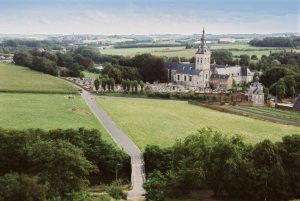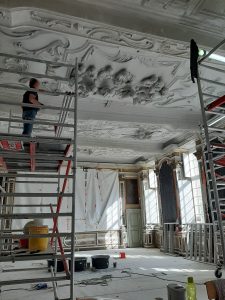The third SKIVRE project meeting was held on the 23rd and 24th of September 2019 in Leuven, Belgium, with the participation of all SKIVRE project partners at the Park Abbey in Leuven, hosted by our network partner Future for Religious Heritage and their member PARCUM, an organisation offering thematic exhibitions and workshops for religion, art, and culture at Park Abbey. A study visit was done to Averbode Abbey close by.
To start with: The SKIVRE team experienced “live” a review of the training modules, because both of the visited abbeys are great examples for business development of monastic products from which the monasteries as well as the whole local environment benefit.

Park Abbey is a Premonstratensian abbey, founded in 1129. It is now part of a huge development project of the Leuven city government undergoing reconstruction of the former Abbey and establishing at the site a multitude of services (agricultural, gastronomic, cultural and as a facility provider for conferences). Restoration work is being carried out, and the various planned initiatives include an ecological farm, a cow stable, the production of ecological milk and cheese, and a microbrewery producing Park Abbey beer. The whole complex has become a hub and meeting place for the citizens of Leuven, with close partnerships with local cooperatives.

Therefore, the site of the abbey and the spirit of the activities were directly linked to our SKIVRE project as the development of monastic products is also an issue at Abbey Park. After discussing the progress of our training modules, their upcoming testing, and many administrative issues related to the project implementation, the operators of PARCUM offered the SKIVRE team most interesting insights of the development of Abbey Park.
The second day started with a visit to Abbey of Averbode. The abbey was founded in 1134 by Arnold II Count of Loon. At that time, their main activity was agriculture, to ensure its sustainability. The monks at Averbode belong to the Norbertine order founded by Saint Norbert. On the guided tour of Father Erik Seghers – responsible for economic activities at the abbey – SKIVRE partners had the opportunity to learn more about their production activities, including beer, cheese, and bread. They also have an editing house, where they produce educational books and magazines. SKIVRE partners had the opportunity to learn more about the innovative management model and community engagement carried out by the Abbey.

An own brand called Het Moment is a perfect example how to develop, brand, and market high-class monastic products.
Obviously, both abbeys are broadly accepted within the local communities: at Monday and Tuesday lunch time the restaurants of the abbeys were both fully booked – always a good sign for a place like them. Both abbeys could perfectly benefit from two of the already developed SKIVRE training modules: the one on “Financing” and the one on “Sustainability”. So we will try to test these training modules with representatives of these abbeys.
Special thanks to our friends and colleagues from FRH for providing the SKIVRE team with these very good practices for monastic products. Special thanks also go to our Advisory Board member Mr Jan Jaspers from the Belgian Centrum voor Religieuze Kunst en Cultuur vzw (CRKC) who helped to arrange our most interesting visits to the abbeys.
(picture credits: ©VisitLeuven.be and ©SKIVRE)

